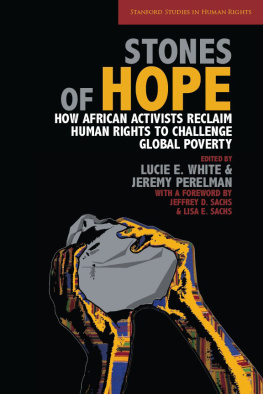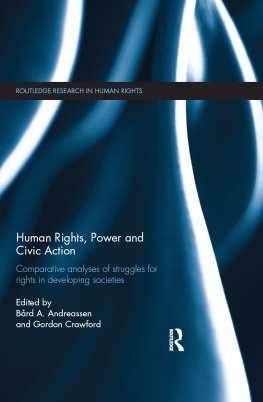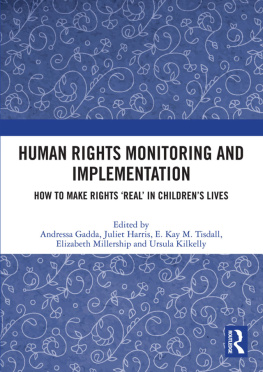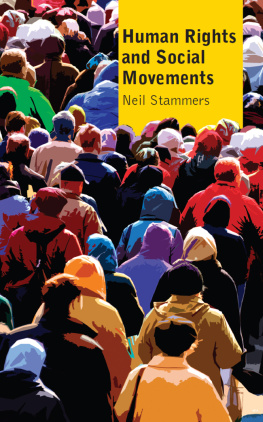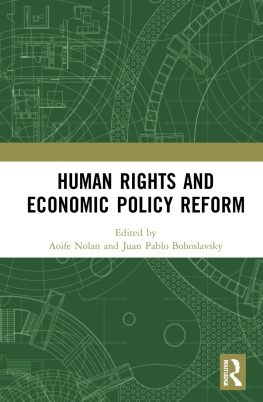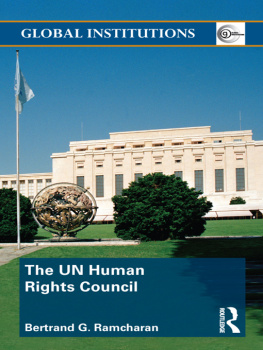Stanford University Press
Stanford, California
2011 by the Board of Trustees of the Leland Stanford Junior University.
All rights reserved.
No part of this book may be reproduced or transmitted in any form or by any means, electronic or mechanical, including photocopying and recording, or in any information storage or retrieval system without the prior written permission of Stanford University Press.
Printed in the United States of America on acid-free, archival-quality paper
Library of Congress Cataloging-in-Publication Data
Stones of hope : how African activists reclaim human rights to challenge global poverty / edited by Lucie E. White and Jeremy Perelman ; with a foreword by Jeffrey D. Sachs and Lisa E. Sachs.
p. cm.--(Stanford studies in human rights)
Includes bibliographical references and index.
ISBN 978-0-8047-6919-8 (cloth : alk. paper)--ISBN 978-0-8047-6920-4 (pbk. : alk. paper)
1. Human rights advocacy--Africa--Case studies. 2. Social rights--Africa. 3. Human rights--Africa. I. White, Lucie, 1949- II. Perelman, Jeremy. III. Series: Stanford studies in human rights.
JC599.A36S76 2011
323.0973--dc22
2010030289
Typeset by Bruce Lundquist in 10/14 Minion Pro
eISBN: 9780804776431
We dedicate this book to the courageous people whose stories are chronicled in it.
JP: To my grandparents, and to M
LW: To Anna, Caroline, and John
We will be able to hew out of the mountain of despair a stone of hope.
Martin Luther King Jr., Speech at the Lincoln Memorial,
Washington, D.C., August 28, 1963
Foreword
Jeffrey D. Sachs and Lisa E. Sachs
More than sixty years after the worldwide adoption of the Universal Declaration of Human Rights, in 1948, economic and social rights (ESR)the very foundation of human survival and well-beingstill elude billions of people, especially the estimated 1.4 billion people who live in extreme poverty. Making ESR operational is an enormous challenge for human rights activists, development practitioners, lawyers, and citizens. The important new book Stones of Hope, edited by Lucie White and Jeremy Perelman, explores this critical topic persuasively and creatively, by delving deeply into several African case studies where ESR has made a real difference in people's rights and well-being. The casesinvolving urban evictions, access to AIDS treatment, rural land tenure, and the healthcare rights of indigentsare terrific in their own right, and in combination make the powerful point that ESR can be a driver of deliberative democracy, institutional innovation, and significant betterment of the living conditions of the poor.
For the world's poorest people, daily life is a struggle for survival, with millions of impoverished people each year losing that struggle to famine, disease, environmental catastrophes, and violent conflicts that arise in conditions of extreme deprivation. Similar desperation applies to girls and women in societies where legal, political, and social institutions offer them scant opportunities and little protection from violence, and to ethnic minorities and indigenous populations that are deprived of access to basic social services and protection by the political system. Ironically, in many parts of the world it is often the descendants of the first arrivalsthe indigenous communitieswho suffer the bitterest combination of poverty and exclusion. Today's dominant groups often wrested their dominance through conquest and exploitation of the indigenous inhabitants and maintain power through violence and extralegal methods.
The pressing challenge of ESR for our generation is not so much in defining their contentswhich have been elaborated in the International Bill of Human Rights (the Universal Declaration of Human Rights of 1948, the International Covenant on Civil and Political Rights of 1966, and the International Covenant on Economic, Social and Cultural Rights of 1966) as well as dozens of treaties, global agreements, and national laws over the past half centurybut rather in maximizing their usefulness as a means of leverage for spreading human survival, dignity, and hope to those trapped in the bitter clutches of extreme deprivation and exclusion. Both of us face this practical challenge as well. As Special Advisor to UN Secretaries-General Kofi Annan and Ban Ki-Moon on the Millennium Development Goals (MDGs), Jeffrey has looked for ways to promote the MDGs through a rights-based approach, that is, promoting the achievement of the MDGs through appeal to the instruments of ESR. Lisa is currently at an academic institution (the Vale Columbia Center on Sustainable Investment at Columbia University) whose aim is to promote sustainable foreign investment. Through the center's work with organizations promoting corporate social responsibility, she has been engaged in translating ESR into norms for corporate responsibility and accountability.
There are many ways to promote the MDGs and corporate social responsibility. Donor nations give development assistance for many reasons, including formal standards like ESR as well as considerations of national security, foreign policy, and national values. Similarly, companies adopt standards of corporate social responsibility, including ESR, for many reasons as well: legal codes, reputation, workplace morale, and customer satisfaction. Economic and social rights is but one of the motivations driving governments and businesses. We strongly endorse the viewpoint of a former UN Rapporteur on the Right to Health, Paul Hunt: Confronted with such a complex and colossal challenge as global poverty, it is extremely important that development practitioners use all the tools available in their workshop, including the national and international human rights commitments of developing and developed states.
International law is notoriously fragile and hamstrung in protecting and promoting ESR adequately, especially in the poorest countries where the need is greatest, such as those of sub-Saharan Africa. There are, of course, several complex challenges. One basic point, not always remembered, is that impoverished countries lack their own budgetary resources needed to supply vitalindeed life-savingservices such as primary healthcare or support for smallholder farmers. The poor are thereby trapped. The lack of public services leads to hunger, poverty, and disease, while the poverty means that the tax base of government is too small to support public policies to alleviate hunger, poverty, and disease. Foreign assistance is then needed to break the vicious circle. In principle, the International Bill of Human Rights creates a poor country's right to receive assistance from the rest of the world. In practice, this right (or conversely, the duty to assist of high-income countries) is difficult to enforce, to say the least.
Of course, the obligations of developed countries vis-a-vis poor countries are joined by the equally or even more critical obligations of domestic governments to realize basic human rights within their own countries. Poor governance, discrimination, corruption, and warped ideologies are unfortunate realities and deep impediments to the realization of ESR in many countries, developing and developed alike. Even when the ESR challenges are more domestic, the use of courts, government agencies, and politics to defend ESR, as well as the overall challenge of leveraging rights into results, is extraordinarily difficult, requiring bravery, persistence, and ingenuity. Efforts to improve governance, accountability, equitable distribution, access systems, and social justice are absolutely necessary. Those efforts are the focus of this pathbreaking volume.

